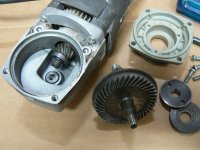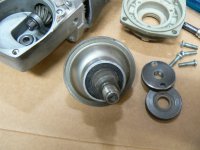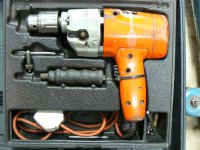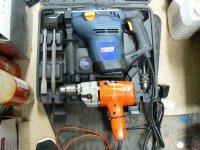I've owned my Black and Decker "Professional" angle grinder for many years, maybe 30? It's only a tiddler which takes 100 mil diameter discs but it's been very reliable and, although used intermittently, it's done a power of work over the years. I've never done any maintenance on it and as I don't have need of it just now I thought I'd dismantle it's gearbox and repack it with grease - I've seen lots of people doing this on you tube videos and I've repacked all the electric drill gearboxes I've owned (except my newest one which is still very, well, new).
So, having removed the screws and prized the casing apart, Imagine my surprise when I saw this:

Not even a wee dod of grease to be seen anywhere! The inside of the casing is spotless! This is obviously how it was assembled and, looking at the condition of the gear teeth, which are immaculate, this is how it's meant to be. Once I'd overcome my surprise I started looking more closely. The teeth show no sign of bluing (which might indicate overheating) and I can tell you it's done some serious grinding in it's time. Also the armature pinion bearing and the much larger bearing on the bevel wheel are both of the sealed type so don't rely on exterior grease and spin very nicely with no signs of roughness:

The bearing in the bottom of the end casing which supports the other end of the bevel gear is of the oilite bush type so I'm not going to slaister any grease in here or on the gear teeth but I am a little tempted to apply a few drops of oil to the bush - question is what oil? I think I'll google oilite bearings for advice.
And now my question to you folks is has anyone had their angle grinder in pieces and if so was it's gearbox "dry" like mine? Having regreased electric drill gearboxes - I've never stripped one and found it not to contain grease - I'm finding this very strange.
So, having removed the screws and prized the casing apart, Imagine my surprise when I saw this:

Not even a wee dod of grease to be seen anywhere! The inside of the casing is spotless! This is obviously how it was assembled and, looking at the condition of the gear teeth, which are immaculate, this is how it's meant to be. Once I'd overcome my surprise I started looking more closely. The teeth show no sign of bluing (which might indicate overheating) and I can tell you it's done some serious grinding in it's time. Also the armature pinion bearing and the much larger bearing on the bevel wheel are both of the sealed type so don't rely on exterior grease and spin very nicely with no signs of roughness:

The bearing in the bottom of the end casing which supports the other end of the bevel gear is of the oilite bush type so I'm not going to slaister any grease in here or on the gear teeth but I am a little tempted to apply a few drops of oil to the bush - question is what oil? I think I'll google oilite bearings for advice.
And now my question to you folks is has anyone had their angle grinder in pieces and if so was it's gearbox "dry" like mine? Having regreased electric drill gearboxes - I've never stripped one and found it not to contain grease - I'm finding this very strange.



